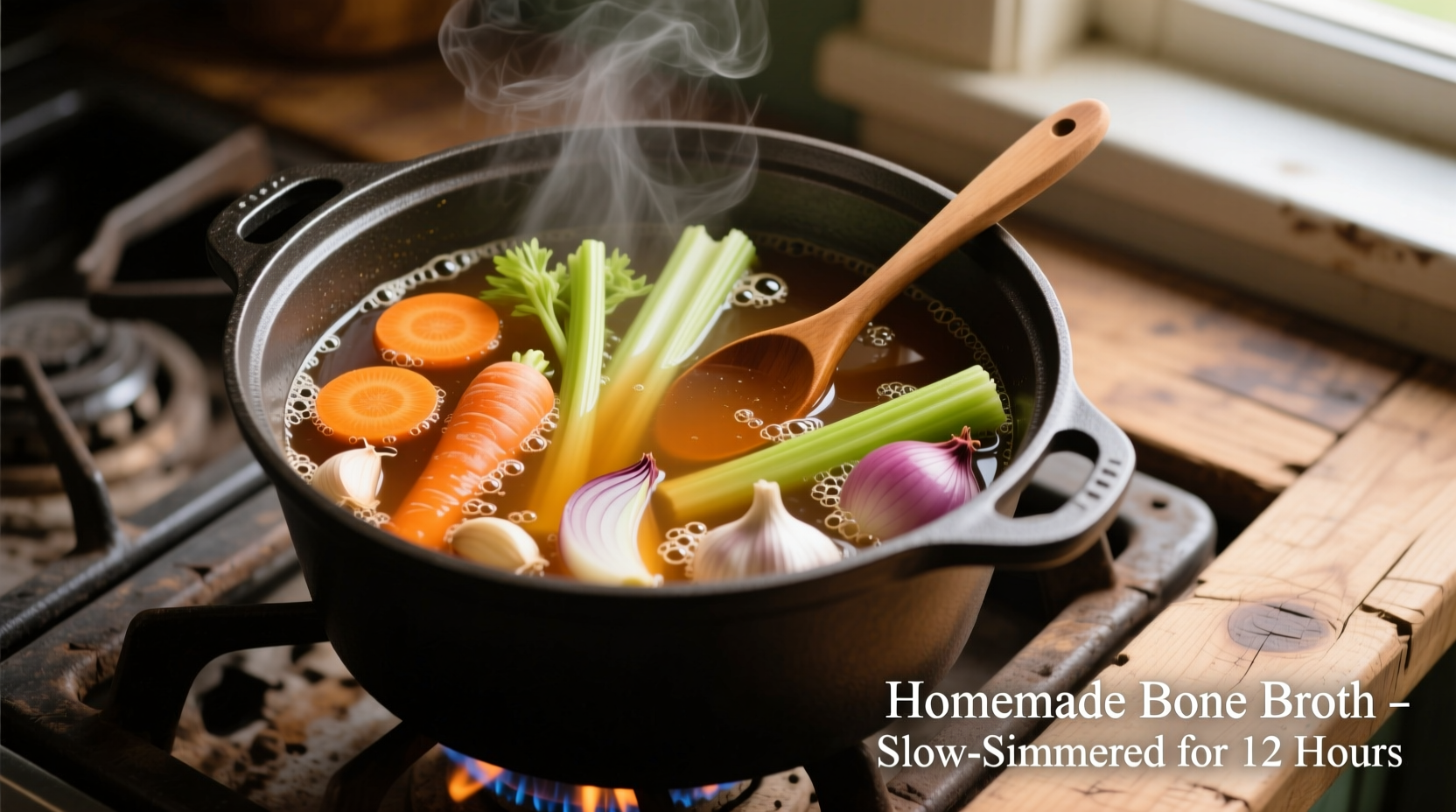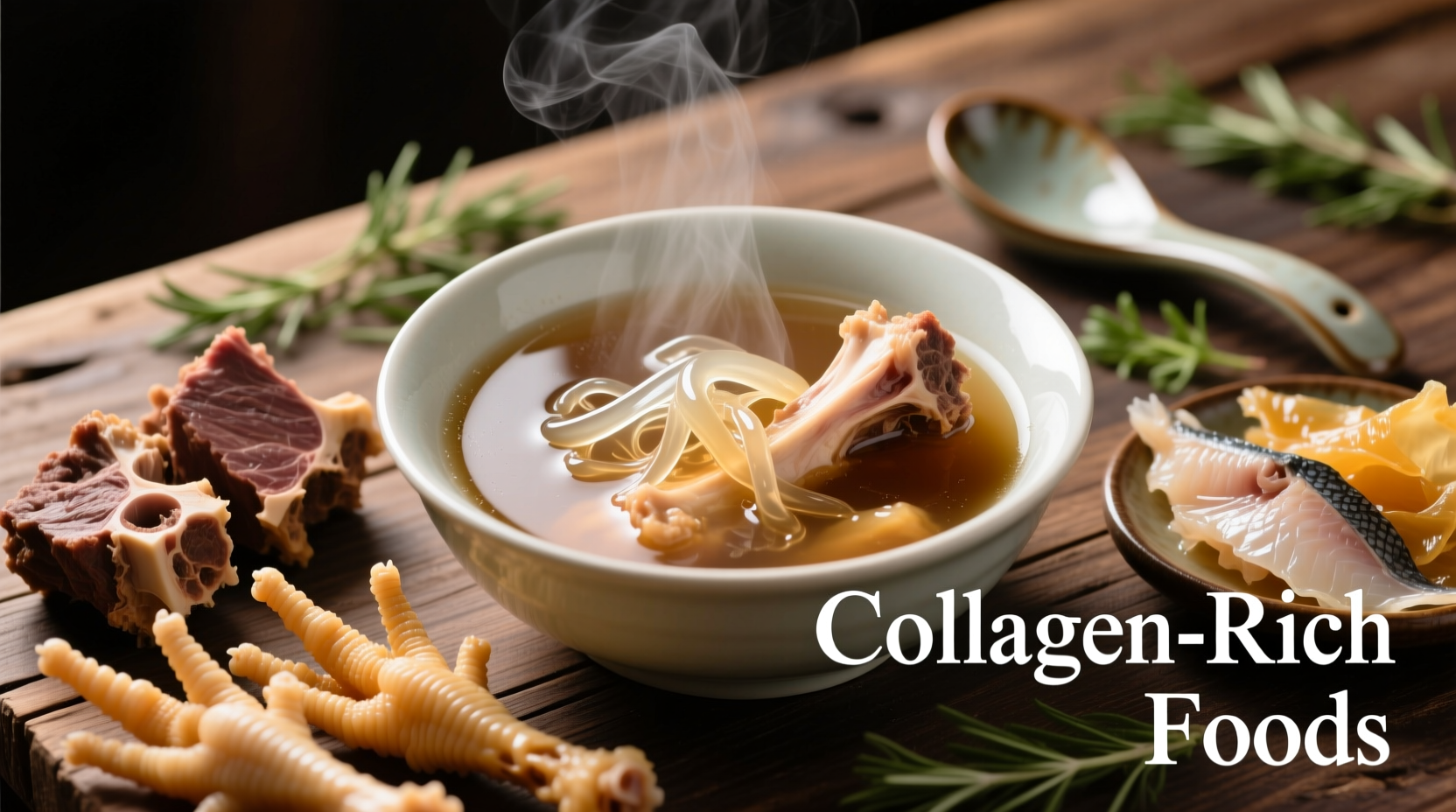The primary natural food sources of collagen include bone broth, chicken skin and connective tissues, fish (especially with skin), pork products with connective tissue, and organ meats. These animal-based foods contain actual collagen that your body can break down into amino acids to support skin, joint, and connective tissue health.
Understanding Collagen in Your Diet: More Than Just Supplements
When searching for "what food has collagen in it," you're likely exploring natural ways to support your body's collagen production. While supplements dominate the market, traditional diets have provided collagen through specific food sources for centuries. Understanding which foods actually contain collagen versus those that merely support collagen production is crucial for making informed dietary choices.
Collagen-Rich Foods vs. Collagen-Boosting Foods
Before diving into specific sources, it's important to distinguish between two categories:
- Collagen-containing foods: These actually provide collagen protein (found only in animal products)
- Collagen-supporting foods: These provide nutrients that help your body produce collagen
Only animal-derived foods contain actual collagen. Plant-based foods cannot provide collagen but can support your body's natural production.
Top Dietary Sources of Actual Collagen
These foods contain measurable amounts of collagen that your body can utilize:
| Food Source | Collagen Content | Preparation Tips |
|---|---|---|
| Bone broth (simmered 12-24 hours) | Highest natural source (5-10g per cup) | Use pasture-raised bones with vinegar to extract maximum collagen |
| Chicken skin and connective tissues | Moderate (2-4g per serving) | Cook slowly to break down collagen into gelatin |
| Fish skin and bones (salmon, sardines) | Moderate (3-5g per serving) | Eat canned fish with bones or cook fish with skin on |
| Pork products with connective tissue | Moderate (2-4g per serving) | Choose cuts like pork shoulder or trotters cooked slowly |
| Organ meats (particularly liver) | Low to moderate | Provides additional nutrients that support collagen synthesis |
How Cooking Methods Affect Collagen Content
The way you prepare collagen-rich foods significantly impacts how much your body can actually utilize. Slow cooking methods transform collagen into gelatin, making it more bioavailable:
- Slow simmering (bone broth): 12-24 hours of gentle simmering with acidic component (like vinegar) maximizes collagen extraction from bones
- Braising and stewing: Low-temperature, long-duration cooking breaks down connective tissues into gelatin
- Avoid high-heat methods: Grilling or frying at high temperatures doesn't effectively convert collagen to gelatin

Foods That Support Your Body's Collagen Production
While these foods don't contain collagen themselves, they provide essential building blocks:
- Vitamin C-rich foods: Citrus fruits, bell peppers, strawberries, and broccoli help convert amino acids into collagen
- Copper sources: Nuts, seeds, and shellfish activate enzymes needed for collagen formation
- Proline-rich foods: Egg whites, cabbage, asparagus, and mushrooms provide this key collagen amino acid
- Zinc-containing foods: Pumpkin seeds, lentils, and beef support collagen synthesis enzymes
Practical Implementation: Adding Collagen Foods to Your Daily Routine
Here's how to incorporate collagen-rich foods without overhauling your entire diet:
- Morning: Start your day with 1 cup of bone broth or add collagen-rich broth to your morning soup
- Lunch: Choose fish with skin (like salmon) or include chicken with the skin on
- Dinner: Prepare slow-cooked stews or braises using cuts with connective tissue
- Snacks: Enjoy pork rinds (made from skin) or gelatin-based snacks
When Dietary Collagen Might Not Be Enough
While food sources provide valuable collagen, certain situations may warrant additional support:
- Aging population: After age 25, natural collagen production decreases by about 1% annually
- Specific health conditions: Those with joint disorders or skin conditions may need additional support
- Dietary restrictions: Vegetarians and vegans cannot access dietary collagen sources
Research from the National Institutes of Health indicates that while dietary collagen can support skin and joint health, individuals with specific health concerns may benefit from targeted supplementation under professional guidance (NIH Study on Collagen Supplementation).
Collagen Food Sources: What the Research Says
A 2022 review published in the Journal of Cosmetic Dermatology analyzed multiple studies on dietary collagen. The research confirmed that collagen peptides from food sources are broken down into amino acids that stimulate fibroblasts to produce new collagen. However, the study also noted that consistent daily intake is necessary for measurable benefits, with most research showing results after 8-12 weeks of regular consumption (Journal of Cosmetic Dermatology, 2022).
Creating a Balanced Collagen-Supporting Diet
The most effective approach combines actual collagen sources with supporting nutrients:
- Pair bone broth with vitamin C-rich vegetables like bell peppers
- Add citrus to fish dishes to enhance collagen utilization
- Combine pork products with copper-rich nuts and seeds
- Include zinc sources alongside your collagen-rich meals
This synergistic approach provides both the building blocks and the necessary co-factors for optimal collagen production.











 浙公网安备
33010002000092号
浙公网安备
33010002000092号 浙B2-20120091-4
浙B2-20120091-4